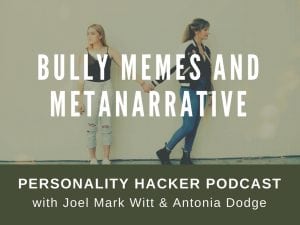Download Episode Here – right click link and select “Save Link As…”
In this episode Joel and Antonia talk about the bully memes that control our mind and how to use frameworks to break free from our current metanarrative.
In this podcast you’ll find:
- Going Clear: Church of Scientology
- When you try to leave the church, and if you mar the reputation of the church, they have an arrangement they call disconnecting.
- Disfellowshipping
- Shunning
- You don’t get to be around anybody you love any more.
- In the movie, the woman who was disconnected could no longer talk to her adult daughter.
- Antonia had a similar experience with her church.
- This shunning creates trauma.
- What happens when you leave a paradigm?
- Memes are thought-viruses.
- Ideas everybody has at the same time.
- Collective unconscious.
- Idea Virus
- It doesn’t even have to be a religion.
- Bully memes: if you don’t do what the bully tells you to do they are going to beat you up.
- Mob mentality
- Institutionalized punishment
- Nobody likes it.
- Why would there be institutionalized shunning?
- Memes want to live like anything else.
- The best way to continue living is by taking an aggressive approach.
- There are belief systems have woven into their teaching that followers need to do what they wouldn’t normally do – be a bully.
- Pittsburgh Steelers are a meme in the Pittsburgh area.
- Fans get violent against opposing teams and their fans.
- A lot of religious and political memes reject anyone who can be considered a rogue element.
- Our bodies are bullies against the diseases that invade it because it doesn’t want to die.
- It is so weird how we allow this to control how we live.
- Institutions encourage behavior that goes contrary to our character and the ancient programming that family is to be valued.
- 1950-1960s – McCarthy Era. Communist propaganda. Blacklisted Hollywood stars.
- The meme in the US at that time was anti-communism. Hollywood stars had a voice, so they had to be silenced.
- Tim Ferriss Podcast was interviewing Tara Brach
- Radical Acceptance
- Trust your wisdom.
- Sometimes a single ego can set the tone and create a bully situation.
- People who become exiled from their communities are trusting their inner wisdom.
- The contrast is those doing the exiling are not trusting their inner wisdom.
- Their inner wisdom is kicking and screaming against the bully narrative.
- We tend not to trust ourselves and place ourselves in perpetual student roles to avoid having to make a stand.
- Align yourself with your inner wisdom. Not everyone else’s.
- Our fundamental biology says don’t go against the tribe because banishment means death.
- But that is no longer the case.
- Once you get to the other side, you realize the truth.
- Err on the side of trusting yourself.
- The bully meme is a significant node in the system, but there are other components in the shunning system.
- Graves Model podcast
- The Graves model is a progression of developmental worldviews.
- Graves level 4: Blue – the worldview in which you identify yourself with a broader community.
- Your identity is indistinguishable from the community/institution.
- You are part of a collective.
- 4 is the first time you exit a family unit and your self-interest and start to see civilization as a top priority.
- When people are ready to graduate from 4 and go into Graves Level 5, they start to lead 4s.
- From working in the bank to being the bank president.
- To 5s, the institution is their bread and butter.
- When people graduate from 5 to 6, their worldview broadens.
- The further along we get on the Graves Model the less we hand power over to these memes.
- Those shunning you are probably Graves 4 or 5, and they have aligned themselves with an institution that just wants to live, and this is its strategy for living.
- They think they will teach you a lesson if they push you out of the tribe.
- Most institutions allow for some reconciliation.
- So they tell themselves they are doing the shunning out of love.
- And to protect the meme.
- You aren’t evil, wrong, or horrible just because you have been booted from your tribe.
- We love stories. We create narratives all the time.
- These memes create stories for us, and we align our internal narratives with the bigger narrative.
- Our narratives then plug into a metanarrative that was over everything else.
- All of our narratives align with that metanarrative.
- There is no overarching metanarrative.
- We are in control of the memes that run in our minds.
- Narratives aren’t hierarchical. They are horizontal.
- Pick a narrative off a shelf.
- When we see new narratives emerging it is hard to awaken to the idea that we have chosen the story in which we live.
- It all seems so real.
- The stakes are high with narratives.
- Reality distortion tunnels.
- Not sharing each other’s narratives is why we kill each other.
- Narratives are powerful and dangerous.
- How much of us are we going to hand over to them?
- Ten years ago, this would have all sounded like complete bullshit.
- If you think your beliefs are so self-evident why does every meme have to have training, or on-ramp, for it?
- Why do we have to reinforce each meme on a continual basis to maintain the programming?
- Look at the fact that everything is trained into you?
- Doesn’t that mean it can also be untrained?
- The resistance comes up because we feel grafted to our belief systems, whatever they may be.
- The point of the PH podcast: All roads lead to empowerment and permission.
- Make sure that every decision you’re making is thoughtful, mindful and comes from a place of empowerment and self-permission.
- Most of us aren’t at a place of empowerment.
- We don’t mean to be subversive. We want to be empowering.
- Models and frameworks are extremely powerful to help you inject more plasticity into your frameworks.
- All models are narratives.
- Each word we speak is a narrative.
- Don’t cling too tightly to your narratives.
To subscribe to the podcast, please use the links below:
Subscribe with iTunes
Non iTunes Link
Download The Android App
Subscribe on Soundcloud
Subscribe with Stitcher
If you like the podcast and want to help us out in return, please leave an honest rating and review on iTunes by clicking here. It will help the show and its ranking in iTunes immensely! We would be eternally grateful!
Want to learn more?
Discover Your Personal Genius
We want to hear from you. Leave your comments below…



Share:
Podcast - Episode 0083 - Are Gurus Dangerous To Follow?
Podcast - Episode 0085 - INTP Personality Type Advice
11 comments
Check out Benefit of the Doubt by Gregory Boyd. You might like it, tanks for the podcast
One of the most important narratives in my life at the moment is the idea of ‘Universal Truth’; not necessarily in the sense that there is a single, well defined, knowable, comprehensive, “Universal Truth” but more that, the Universe is Truth and there is truth we can find in seeking to understand the universe.
It seems a bit contradictory to say that there is no single truth and then to say that the universe is truth, but it’s more about the idea that the word ‘universe’ (setting aside other theoretical concepts like multi-verse theory) is what we use to describe the whole expanse of what is real. While, this philosophy takes an undeniable ‘scientific’ lean for myself personally, it’s certainly not limited to the testable facts of the universe. Coming from the background I come from, I find comfort in being able to attribute the broad majesty and wonder of life to a single overarching concept, that doesn’t limit the majesty of the thing or the expansiveness of the concept I am attributing it to. So, some may a define my philosophy as a impersonal variation of monotheistic theology. However, there is a significant amount of freedom and coherency that this narrative gives to my life. I still believe in the idea of singular truth, but I don’t necessarily believe it may be gasp by people, at least in this life time. So, I have something to search for and strive for, while leaving myself open to the possibility of changing my paradyme as new evidence presents itself, without the feeling of guilt associated with potentially being on the ‘wrong side of the theological debate’. To wrap things up, I would say that the above describes my current life philosophy, at the same time, I have a very personal religious paradyme that I hold in conjunction with this philosophy. I am still not sure if holding a simultaneous life philosophy and life theology is unnecessary or contradictory (perhaps like running two anti-virus software at the same time) but it has helped me create a richer, multi-dimensional framework for my life. I am always willing to discuss things with people but I would like to see myself as an advocate for truth or more aptly, a truth seeker.Seeing metanarratives as horizontal (i.e. becoming ‘post-modern’) isn’t ideal because it’s not the acme of development. It is, however, how most people are currently experiencing Graves level 6 (for the most part) and it’s often the first time a person truly questions their reality tunnel. Once the level has been fully explored then a reevaluation of ‘horizontal meme’ thinking is not only a great idea, but one you can’t stop. From my limited experience, Level 7 generates a strong distaste for seeing all beliefs and paradigms as relatively equal.
The world doesn’t punish you for staying in 4 and it actively rewards you for 5. Coaching people into Graves level 6 seems high leverage to me, even if the journey doesn’t stop there.
I admit – I do see memes as ‘alive’ in the same way as viruses. I don’t ‘believe’ it to be true, but it’s been a super helpful way for me to understand how they develop, take over and maintain supremacy.
A
Thanks for the feedback, Nancy, and the book recommendation. I looked it up and it looks interesting.
Good podcast but I didn’t like the way you anthropomorphized memes. I don’t think memes are “alive” which is the way they were continually described. I think they are driven by individual/cultural epistemologies or meta-narratives which are adopted to satisfy actual or perceived life conditions and become closely held at the level of identity. When the meme is threatened then identity is threatened.
Also, you mentioned meta-narratives as being horizontal and relative but the Graves model implies that meta-narratives can be identified vertically [and expanded horizontally]. I think this reduction to horizontal relativity thinking is the problem with postmodernity and resultant lack of anything being ultimately true or real. Thinking is perhaps better served with a horizontal/vertical epistemology along the lines of Wilber integral model or Gabriel’s new realism philosophy.